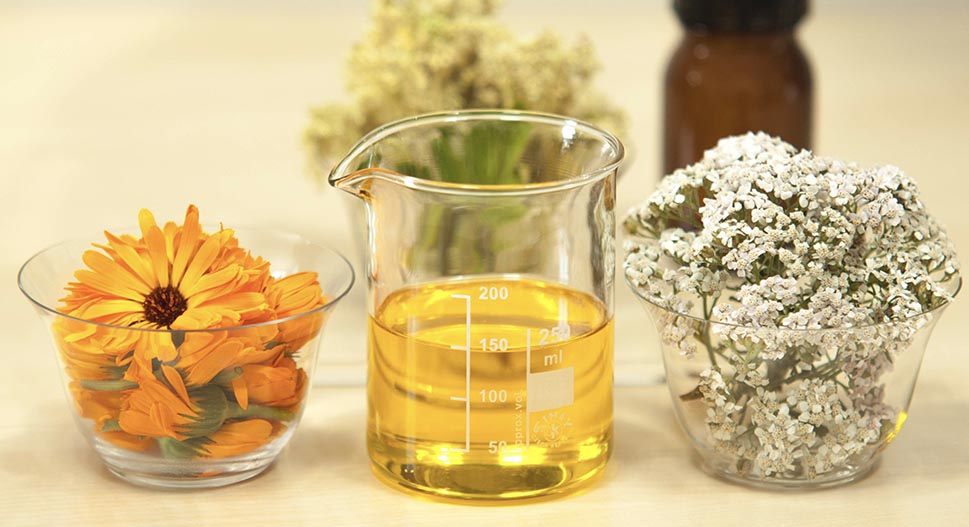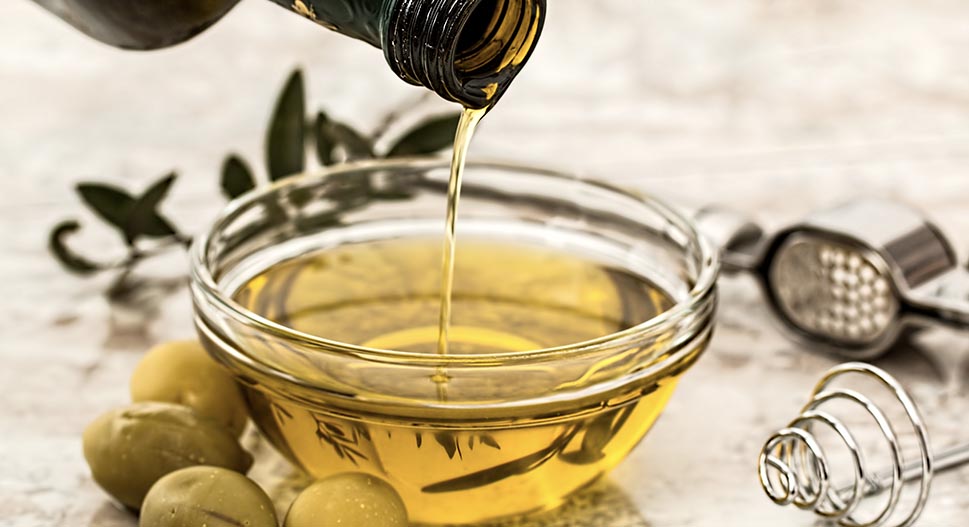
Choosing the right oil to cook with is a complicated business. Supermarket shelves are packed with so many options.
To add to the confusion there is so much debate about the benefits and harm that come from consuming different types of fats. For example, you may think that frying with vegetable oils is healthier than cooking with animal fat like butter.
But is it really? Let’s find out.
What are the Different Types of Oils?
Depending on the chemical composition, some oils will be more suitable for use at higher temperatures, others for sautéing and others better for use as salad dressings.
In general, oils can be classified as:
- Refined (or processed)
- Unrefined (typically cold-pressed)
What are refined oils?
Refined oils are heated during production and often processed with chemicals, which increases their shelf life and their smoke points, but also eliminates many of the healthful vitamins and nutrients.
What are unrefined oils?
Unrefined oils are not processed and are typically bottled immediately after pressing. Technically, any oil heated past +/- 50 °C or 120°F cannot be considered cold-pressed. Unrefined oils tend to have strong flavours and are higher in nutrients and minerals, but they also have a lower average smoke point and a shorter shelf life than their refined oil counterparts.
What is the ‘Smoking Point’ of an Oil?
Cooking with oils changes their composition dramatically. Firstly, polyphenols and other plant chemicals break down when they are heated. How high you heat the oil is therefore critical.
The smoking point of an oil is the temperature at which the oil starts to smoke. At this point, the molecular structure of the fat/oil change. It undergoes oxidation – by reacting with oxygen in the air to form aldehydes and lipid peroxides.
Consuming or inhaling aldehydes, even in small amounts has been linked to increased risk of heart disease and cancer. The higher the smoke point, the more stable the oil when it is heated.
At room temperature something similar happens, though more slowly. When fats go rancid they become oxidised.
Smoking Points of Various Oils
A good rule of thumb is that the more refined the oil, the higher the smoke point:
Oils with a high smoke point (> 230 °C)
- These are suited to searing, browning, and deep frying (2):
|
°C |
|
|
Avocado Oil |
269 |
|
Refined Olive Oil |
199 - 243 |
|
Refined Sunflower Oil |
253 |
|
Refined Coconut Oil |
235 |
|
Peanut Oil |
233 |
|
Refined vegetable oil |
220 |
Oils with a medium-high smoke point (200 - 229 °C)
- These are suited to baking or stir-frying (2):
|
°C |
|
|
Refined vegetable oil (blend) |
220 |
|
Virgin Olive Oil |
210 |
|
Refined Rapeseed Oil |
204 |
|
Safflower Oil |
229 |
Fats with a medium smoke point (150 - 199 °C)
- These are suited to light baking or low temperature sautéing (2):
|
°C |
|
|
Butter |
150 |
|
Unrefined Coconut Oil |
177 |
|
Lard |
190 |
|
Extra Virgin Olive oil |
160 - 190 |
|
Unrefined flaxseed oil |
107 |
|
Unrefined Canola oil |
107 |
Now if only it was as easy as smoking points. The composition of oils is also very important.

The Composition of Fats and Oils
All fats, including oils, are a combination of three fatty acids:
- monounsaturated
- polyunsaturated
- saturated fats
It is this combination that is key when deciphering what oil to use when. Current guidelines generally encourage us to limit saturated fat to 11% total energy intake. They also recommend that we swap out saturated fats – found in foods like diary - for unsaturated fats like olive oil, rapeseed oil, sunflower oil, nuts and seeds.
There is however, increasingly more evidence showing that saturated fat is not associated with heart disease risk. What the evidence still doesn’t “prove” to date is that eating more saturated fat is better for you.
In addition, research suggests oils that are rich in polyunsaturated fats also generate very high levels of aldehydes. Olive oil, cold-pressed rapeseed oil and butter on the other hand have been found to produce far less aldehydes, as they contain a higher percentage of monounsaturated and saturated fats.
So which cooking oil is healthiest?
Studies have shown time and time again that people who follow the Mediterranean-style diet have a lower rate of heart disease. Olive oil, which is approximately 76% monounsaturated, is a key component in the Mediterranean diet, which has been shown to significantly reduce the risk of heart disease.
A recent trial (PREDIMED) also looked at a low-fat diet compared to a Mediterranean diet supplemented with olive oil or nuts and found an approximate 30% decrease in cardiovascular events over 4.8 years for those following a Mediterranean diet, despite the increased fat intake.
In my clinical practice, I recommend choosing an oil or fat that is high in monounsaturated or saturated lipid (preferably more than 60% for one or the other and more than 80% for the two combined) and low in polyunsaturated fat (less than 20%).
|
Type of oil/fat |
Polyunsaturated (%) |
Monounsaturated (%) |
Saturated (%) |
|
Coconut oil |
2 |
6 |
86 |
|
Butter |
3 |
21 |
51 |
|
Lard |
11 |
45 |
39 |
|
Goose fat |
11 |
56 |
27 |
|
Olive oil |
10 |
76 |
14 |
|
Corn oil |
54 |
27 |
12 |
|
Sunflower oil |
65 |
20 |
10 |
|
Sesame oil |
41 |
40 |
14 |
|
Rapeseed Oil |
28 |
63 |
7 |
5 Top Tips for Cooking with Oil
No matter the source of fat, the fact still remains that fat is still very calorie dense. Like anything, over-eating fat will lead to weight gain if the calories you eat exceed the calories you burn.
Here are some practical tips to keep in mind when making your oil/fat choices.
1. Fry Less!
This is particularly linked to frying at a high temperature. If you are frying, minimise the amount of oil you use and take steps to remove the oil from the outside of the fried food – even with a paper towel for example.
2. Keep up the variety
Don’t make a pact with any certain oil. As with many dietary recommendations variety is the key. My kitchen fat and oil staples include extra virgin olive oil, unrefined avocado oil, unrefined coconut oil and butter.
3. Reduce aldehyde production
Choose unrefined oils and fats, as well as fats that are that have a higher proportion of monounsaturated or saturated fats.
4. Store well
Keep your oils out the light in a cupboard and definitely don’t re-use them again
5. Keep the bigger picture in mind - always
Think of foods and dietary patterns as a whole to fully understand their implications for human health and prevention of disease. Reducing your risk of cardiovascular disease and other chronic diseases depends on many factors such as body shape, lifestyle habits, stress management, sleep routine and what your overall diet looks like. Choosing the right oils and fats should be part of a healthy diet and lifestyle.
References
- Thomas B & Bishop J (eds) and The British Dietetic Association (2007). Manual of Dietetic Practice. Fourth Edition. Oxford: Blackwell Publishing.
- Smoking points of oils on Wikipedia https://en.wikipedia.org/wiki/Template:Smoke_point_of_cooking_oils
- Refining of Oils http://www.fao.org/docrep/v4700e/V4700E0a.htm
- Gershuni V. Saturated Fat: Part of a Health Diet. Gastroenterology, Critical Care and Lifestyle Medicine. 10.1007/s13668-018-0238
- Webb, F, Whitney W, Sizer F, Whitney E. 2011. Nutrition: concepts and controversies
- Hooper L et al. 2011. Reduction in saturated fat intake for cardiovascular disease. Cochrane Database of Systematic Reviews
- Ramsden CE, et al. Re-evaluation of the traditional diet-heart hypothesis: analysis of recovered data from Minnesota coronary experiment (1968-73). BMJ. 2016;353:i1246.
- Felton CV, Crook D, Davies MJ, Oliver MF. Dietary polyunsaturated fatty acids and composition of human aortic plaques. Lancet. 1994;344:1195–6.
- De Souza RJ et al. Intake of saturated and transfats unsaturated fatty acids and risk of all-cause mortality, cardiovascular disease, and type 2 diabetes; systematic review and meta-analysis of observational studies: BMJ 2015: 351;h3978
- Bishop K. Everything you need to know about storing oils/fats. Preparedness Pro website. http://www.preparednesspro.com/everything-you-need-to-know-about-storing-oilsfats






























































